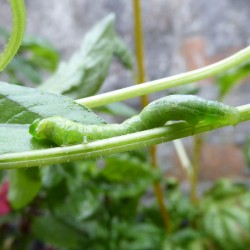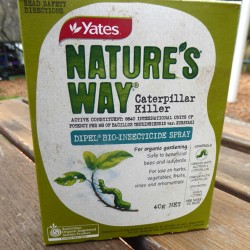Budworm moth
Budworms are caterpillars of the Helicoverpa moth family. The moths lay their eggs at night on young foliage close to fruits or flower buds and the young caterpillars feed on the foliage first before moving into buds or developing fruits.
Budworm moths choose several fruits for their young ones, in our garden they are a particular problem with the tomatoes and chilies.
After several weeks of feeding, the caterpillars burrow into the topsoil beneath the plant and pupate. Rain that produces a burst of new plant growth will signal an opportune time for adult moths to emerge from pupa cases and lay eggs.
Caterpillars of budworm moths affect flowers and the fruit from a very early stage. They are a serious pest and if not contained they will affect nearly every fruit. Fine netting keeps the moths away from the plants. Fruits that show holes are taken out and discarded. The caterpillars that are already inside the netting are treated with a bacterial spray that stops their activity.
Dealing with caterpillars
Caterpillars are the larvae of butterflies and moths. They are voracious eaters can can easily destroy a crop. The two most common caterpillars we deal with in our garden are the cabbage butterfly larvae and the larvae of the tomato bud worm. Preventive measures to avoid caterpillar problems Plant companion plants! This confuses the parent [more]
Dipel
Dipel is a product used to control caterpillars. It is approved for use in organic gardening. It is made from naturally occurring bacteria (Bacillus thuringiensis) and is safe on bees, ladybirds, birds, fish, mammals and pets. Dipel has no withholding period: vegies, fruit and salad ingredients can be washed and eaten immediately after spraying. [more]

